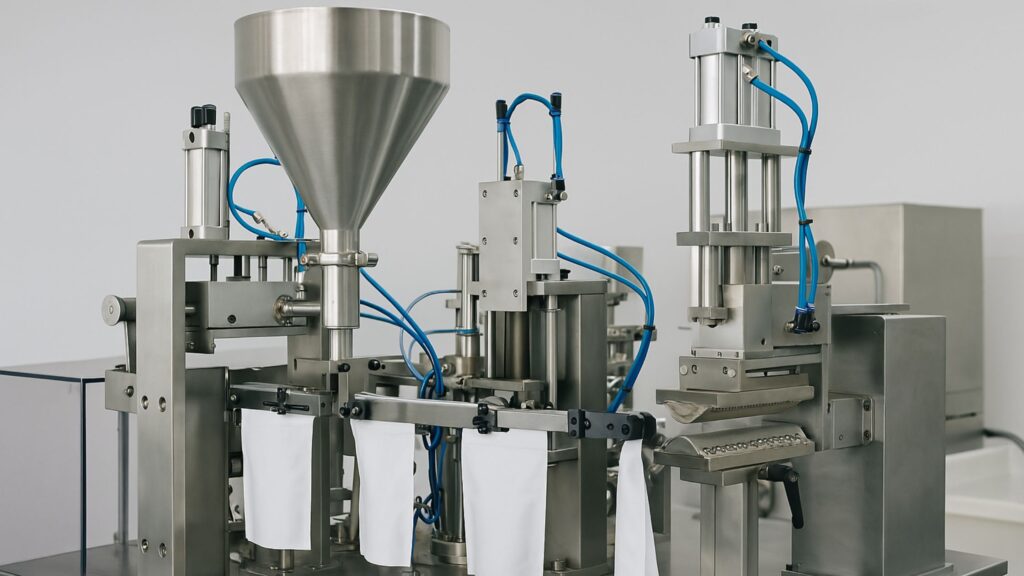In today’s fast-paced manufacturing world, packaging machines play a crucial role in ensuring efficiency, consistency, and cost-effectiveness. Whether you are in the food and beverage industry, pharmaceuticals, cosmetics, or logistics, packaging machines have revolutionized the way products are packed, stored, and transported. This comprehensive guide will explore different types of packaging machines, their benefits, and their various applications across industries.
What Are Packaging Machines?
Packaging machines are automated or semi-automated systems designed to package products into containers, pouches, bottles, boxes, or other forms of packaging. These machines help improve production speed, maintain product quality, and reduce labor costs. Depending on the type of product and packaging requirements, different packaging machines are used in various industries.
Types of Packaging Machines
1. Filling Machines
Filling machines are used to fill products into containers or pouches. These machines are commonly used in food and beverage, pharmaceuticals, and cosmetic industries. Different types of filling machines include:
- Liquid filling machines (for beverages, oils, sauces, and syrups)
- Powder filling machines (for spices, flour, and pharmaceutical powders)
- Granule filling machines (for seeds, coffee beans, and grains)
2. Sealing Machines
Sealing machines ensure airtight and leak-proof packaging. They are widely used in food packaging to maintain freshness. Types include:
- Heat sealers (used for plastic packaging)
- Induction sealers (for sealing bottle caps with aluminum foil)
- Vacuum sealers (for preserving perishable goods)
3. Wrapping Machines
Wrapping machines are used to wrap products in plastic film, shrink film, or paper. These machines are commonly used in retail packaging and bulk packaging. Types include:
- Shrink wrap machines (for securing products with shrink film)
- Stretch wrap machines (for pallet wrapping)
- Flow wrap machines (for packaging food items like biscuits and chocolates)
4. Labeling Machines
Labeling machines automate the process of applying labels to packages, bottles, and containers. They are essential for branding and providing product information. Types include:
- Pressure-sensitive labelers (for self-adhesive labels)
- Sleeve labelers (for shrink sleeve labels on bottles)
- Print and apply labelers (for barcodes and batch numbers)
5. Cartoning Machines
Cartoning machines are used to pack products into cartons or boxes. These machines are crucial in industries like pharmaceuticals, cosmetics, and food. Types include:
- Horizontal cartoning machines (for products that slide into boxes)
- Vertical cartoning machines (for products dropped into cartons)
- End-load cartoners (for high-speed production lines)
6. Blister and Skin Packaging Machines
These machines are used to package products in plastic or foil blisters, providing excellent product protection and visibility. Common applications include pharmaceutical tablets, electronics, and small consumer goods.
7. Palletizing Machines
Palletizing machines arrange and stack packaged goods on pallets for easier transportation and storage. Types include:
- Robotic palletizers (for high-speed automation)
- Conventional palletizers (for structured stacking)
Benefits of Packaging Machines
1. Increased Efficiency
Automation speeds up the packaging process, allowing manufacturers to meet high demand with minimal manual labor.
2. Cost Reduction
Packaging machines reduce labor costs and material wastage, leading to lower production expenses in the long run.
3. Enhanced Product Safety
Sealed and packaged products are protected from contamination, damage, and external factors that could compromise quality.
4. Consistency and Accuracy
Automated machines ensure uniform packaging, reducing errors and improving product presentation.
5. Compliance with Regulations
Many industries require strict adherence to packaging standards. Packaging machines help ensure compliance with industry regulations and labeling laws.
Applications of Packaging Machines Across Industries
1. Food and Beverage Industry
- Automated filling machines for soft drinks, dairy products, and sauces
- Sealing machines to preserve freshness and extend shelf life
- Labeling machines for product branding and nutritional information
2. Pharmaceutical Industry
- Blister packaging for tablets and capsules
- Cartoning machines for packaging medicine bottles
- Tamper-proof sealing machines for safety compliance
3. Cosmetics Industry
- Tube filling machines for lotions and creams
- Labeling machines for cosmetic packaging
- Cartoning machines for boxed beauty products
4. Logistics and E-commerce
- Stretch wrap machines for securing shipments
- Palletizing machines for warehouse storage
- Carton sealing machines for packaging online orders
Choosing the Right Packaging Machine
Selecting the right packaging machine depends on factors like product type, production volume, budget, and specific packaging requirements. Here are some key considerations:
- Product Nature: Liquid, solid, granulated, or powdered?
- Production Scale: Small-scale or large-scale manufacturing?
- Packaging Material: Plastic, glass, metal, or paper?
- Automation Level: Manual, semi-automatic, or fully automatic?
Conclusion
Packaging machines have transformed industries by enhancing efficiency, reducing costs, and ensuring product safety. Whether you’re in food processing, pharmaceuticals, or e-commerce, investing in the right packaging machinery can streamline your operations and improve product quality. As technology advances, the future of packaging machines will continue to evolve, offering smarter, faster, and more sustainable solutions.
Related Articles
- Primary Packaging and Secondary Packaging: Understanding Their Roles in Product Protection and Marketing
- Functional Secondary Packaging: Enhancing Efficiency, Protection, and Branding
- Understanding Food Secondary Packaging: Importance, Types, and Benefits
- Pharma Secondary Packaging: Importance, Types, and Best Practices
- The Role of Secondary Packaging Equipment in Modern Manufacturing
- Sustainable Secondary Packaging: A Key to Greener Supply Chains
- Kraft Paper Packaging: A Sustainable and Versatile Choice for Businesses
- The Future of Carton Packaging: Sustainability, Innovation, and Market Trends
- Polybag Packaging: Benefits, Uses, and Sustainability
- The Versatility and Importance of Plastic Wrap Packaging

